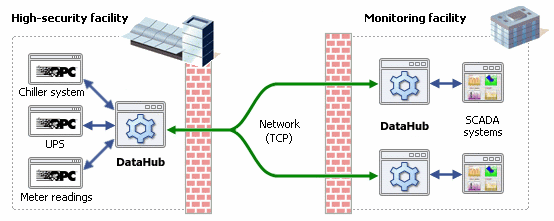Case Study: Siemens, Denmark
Integrating OPC servers and data from high-security facility
In a recent data integration project, Siemens engineers in Copenhagen, Denmark were able to connect equipment and instrumentation running in a high-security facility to a remote monitoring location, using DataHub® software. The goal was to allow technicians access to the machines they needed to work on, without breaching security or permitting any non-authorized personnel on site.
At first the project promised to be a typical OPC application. The main objective was to connect a chiller unit with an OPC DA server running at a secure facility to two SCADA systems at a monitoring station, each enabled as an OPC DA client. However, it soon became apparent that there would be some problems with networking. OPC DA networking depends on DCOM, which at the best of times can be difficult to configure and slow to reconnect after a network break. To make matters worse, the OPC server provided by the chiller manufacturer was not up to the task.
“This particular OPC server has some strange behaviors,” said Carsten Barsballe, the project leader. “It won’t run as a service, and it won’t allow remote connections using DCOM, because when you disconnect, you are not able to reconnect. So we decided to encapsulate it in DataHub software.” Barsballe installed a DataHub instance on the same machine as the chiller’s OPC server, and configured it to run as a service, causing it to connect whenever the system starts. This allows him to use the DataHub instance for all OPC client connections.
At the monitoring facility, Barsballe discovered another potential setback. His SCADA systems were not able to connect remotely to an OPC server. They required a local OPC connection, so Barsballe decided to use DataHub tunnel/mirroring. He installed two more DataHub instancess, one on each SCADA system machine, and configured tunnel/mirror connections across the network to the first DataHub instance. His SCADA systems each connected to their local DataHub instance, and the data link was complete. Technicians could now view data from the high-security facility from the safe distance of the monitoring location.
“The two SCADA systems are separate from the chiller unit, but fully connected in real-time, so technicians can work on them as they are used to,” said Barsballe. “This is a way to keep people from touching things they don’t know about. We have lots of people working at all hours, and now there is no need to for them to be onsite at any time.”
With the chiller system up and running, Barsballe plans to integrate more data sources into the system. They have a few UPS (uninterruptible power supply) units with SNMP connectivity that they need to monitor, and by adding an SNMP-OPC server, the data from these will be brought into the DataHub instance. After that, they will also attach an OPC server for several meter-reading input devices. All of this data will then be sent across to the SCADA systems, and made available to the service people who need access to it.
“The DataHub software is running very well,” said Barsballe. “We do a lot of this kind of data integration, and there will be other projects. Now we have a good feeling for this product. We have chosen the right solution.”






